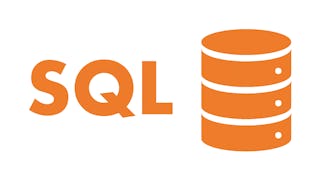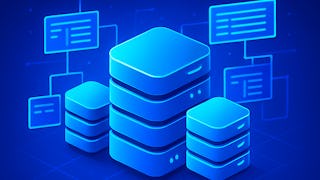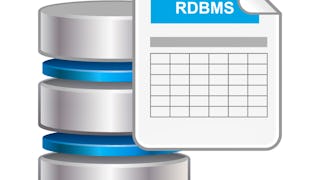Database management systems are a crucial part of most large-scale industry and open-source systems. This course will introduce you to important concepts of database systems and design. We will learn what relational databases are, what they are used for, the theory underlying their design, and how to query and modify a database using the declarative SQL language.


您将学到什么
Describe what relational databases are, and how they are used.
Master the Relational Database Model.
Demonstrate comprehensive SQL skills.
您将获得的技能
要了解的详细信息

添加到您的领英档案
21 项作业
了解顶级公司的员工如何掌握热门技能

积累特定领域的专业知识
- 向行业专家学习新概念
- 获得对主题或工具的基础理解
- 通过实践项目培养工作相关技能
- 获得可共享的职业证书

该课程共有4个模块
Welcome to Introduction to Relational Databases! In this course, we will cover the topics of: Database Overview, Relational Algebra, SQL. This learning module provides a comprehensive introduction to relational databases, their applications, and components. Starting with an introduction to databases and their diverse applications, the module discusses the components of relational database schemas, including relations, attributes, and keys. Students will learn to design simple database schemas and understand key database concepts such as records, data retrieval and modification, and primary/foreign keys. The module includes real-world examples for practical understanding.
涵盖的内容
7个视频9篇阅读材料6个作业1个讨论话题
This learning module explores the fundamental concepts and operations of relational algebra, the theoretical foundation of relational databases. It introduces basic relational algebra concepts such as 'relation', 'tuple', and 'operation', and then dives into fundamental relational algebra operations, including selection, projection, and union. Students will also learn about more advanced operations like joins and division, expanding their understanding of how complex data relationships can be managed. Further, the module will cover composite and aggregation operations to handle more intricate data manipulations, as well as operations for modifying relations. This module gives students a firm theoretical foundation to work with relational databases.
涵盖的内容
7个视频5篇阅读材料6个作业
This learning module provides an in-depth understanding of SQL (Structured Query Language), the standardized language used for managing relational databases. Starting with the fundamentals, students will learn to utilize SELECT and set operations to extract relevant information from database tables. The module then transitions into more complex queries involving joins, enabling students to locate and amalgamate information from multiple database tables. It further delves into modifying database tables, defining their structures, creating referential integrity constraints to maintain database consistency, and controlling user database access via SQL commands. Learning SQL will equip students with the knowledge and skills necessary to effectively manage and manipulate data in relational databases .
涵盖的内容
12个视频6篇阅读材料8个作业
This module contains the summative course assessment that has been designed to evaluate your understanding of the course material and assess your ability to apply the knowledge you have acquired throughout the course. Be sure to review the course material thoroughly before taking the assessment.
涵盖的内容
1个作业
获得职业证书
将此证书添加到您的 LinkedIn 个人资料、简历或履历中。在社交媒体和绩效考核中分享。
攻读学位
课程 是 Illinois Tech提供的以下学位课程的一部分。如果您被录取并注册,您已完成的课程可计入您的学位学习,您的学习进度也可随之转移。
从 Data Analysis 浏览更多内容
 状态:预览
状态:预览Universitat Politècnica de València

Birla Institute of Technology & Science, Pilani
 状态:免费试用
状态:免费试用
人们为什么选择 Coursera 来帮助自己实现职业发展




常见问题
To access the course materials, assignments and to earn a Certificate, you will need to purchase the Certificate experience when you enroll in a course. You can try a Free Trial instead, or apply for Financial Aid. The course may offer 'Full Course, No Certificate' instead. This option lets you see all course materials, submit required assessments, and get a final grade. This also means that you will not be able to purchase a Certificate experience.
When you enroll in the course, you get access to all of the courses in the Specialization, and you earn a certificate when you complete the work. Your electronic Certificate will be added to your Accomplishments page - from there, you can print your Certificate or add it to your LinkedIn profile.
Yes. In select learning programs, you can apply for financial aid or a scholarship if you can’t afford the enrollment fee. If fin aid or scholarship is available for your learning program selection, you’ll find a link to apply on the description page.
更多问题
提供助学金,






